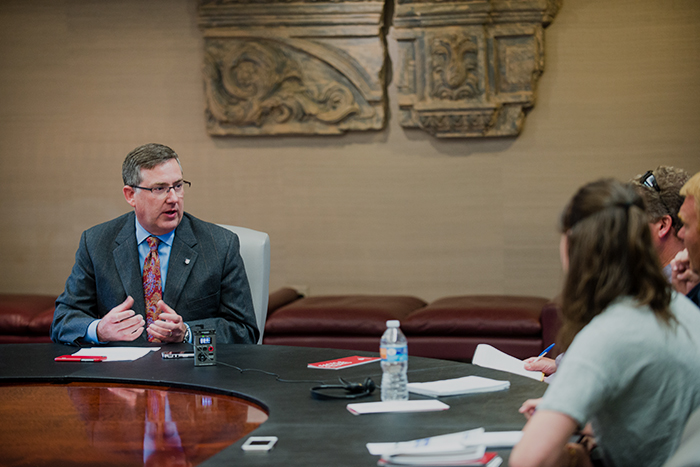Graduate students need financial security
DES MARKS | Daily Evergreen file
WSU President Kirk Schulz answers questions from students and audience members during a press conference on Aug. 22, 2016.
February 22, 2017
WSU’s contract with its graduate students is broken. If President Schulz continues to be serious about the “Drive to 25” initiative, this relationship needs to be mended.
The cracks in this relationship were first demonstrated in the 2016 revelation that the IRS regulations under the Affordable Care Act prohibited WSU’s Student Health Insurance Plans (SHIPS). The Department of Labor extended the university’s ability to continue these plans indefinitely, but an alternative insurance system is needed.
The WSU Graduate and Professional Student Association (GPSA) describes three likely alternatives in the absence of any federal regulatory changes. The first option is to allow graduate students to purchase their own insurance plans, though many students earn stipends that barely exclude them from Medicaid eligibility. The second is to increase assistantship stipends. The third is to create an employee health plan that will likely cost students thousands per year and the university millions.
The insurance debate does not affect domestic students without an assistantship. Indeed, only 40 to 50 percent of graduate and professional students have assistantships, part-time jobs for graduate students to either teach, assist in research or work for an on-campus organization.
“The bottom line is that this rule will cost universities millions of dollars and/or leave thousands of graduate students across the country without affordable, university-provided health insurance,” the GPSA states on its website.
Just focusing on those graduate students who can get assistantships, the Graduate School states most assistantship positions are part time. Moreover, many of these will only cover employment through the roughly nine-month school year.
Effective Jan. 1, 2016, the Graduate School’s salary grid indicates only the top 60 of 115 salary steps are above $18,918, the Whitman County living wage rate for one adult. However, many graduate and professional students are married with children.
Moreover, the Graduate School admits there is exceptional heterogeneity among stipends due to the diversity of budgets among the different WSU colleges and schools.
Since many doctorate decisions come with funding offers, those hurt most by this lack of assistance are Pullman-based master’s students. Indeed, the Graduate School Policies and Procedures Manual states the availability of assistantships, not the guarantee.
“As aids to graduate education, Washington State University has teaching, research and staff assistantships available for qualified graduate students who are pursuing programs of study leading to advanced degrees at WSU,” according to the manual.
Even with an assistantship stipend and tuition waver, graduate students are still responsible for almost $1,000 in student fees.
Andrea Wessel, a master’s student in education and a Center for Civic Engagement graduate assistant, said loans are often necessary to cover these fees and provide a financial cushion.
“Even if you do take out loans, that work study comes out of your financial package. The student loan debt you are allowed to take out is really, really small,” Wessel said. “I don’t have children, but I think about the people who do and positions they are put in (financially).”
To lend perspective, the estimated Whitman County living wage for one adult and one child is $43,235 before taxes; the highest graduate nine-month stipend is $34,339.50.
With or without assistance, graduate and professional students of all levels are expected to produce original research and innovation. Any original creation then belongs to WSU as copyright since university materials and resources were used. Graduate students create value for the university without being compensated decently for it.
A key element in creating top 25-level research will be recruiting top-level graduate students. Graduate students will not stay, let alone come to WSU, without the university placing the same value in them that they create for the university.
An administration serious about carving its way into national prestige must seriously reevaluate the benefits and compensation it gives its graduate students.
Tyler Laferriere is a graduate student pursuing his master’s in economics from Phoenix, Arizona. He can be contacted at 335-2290 or by [email protected]. The opinions expressed in this column are not necessarily those of the staff of The Daily Evergreen or those of The Office of Student Media.





















